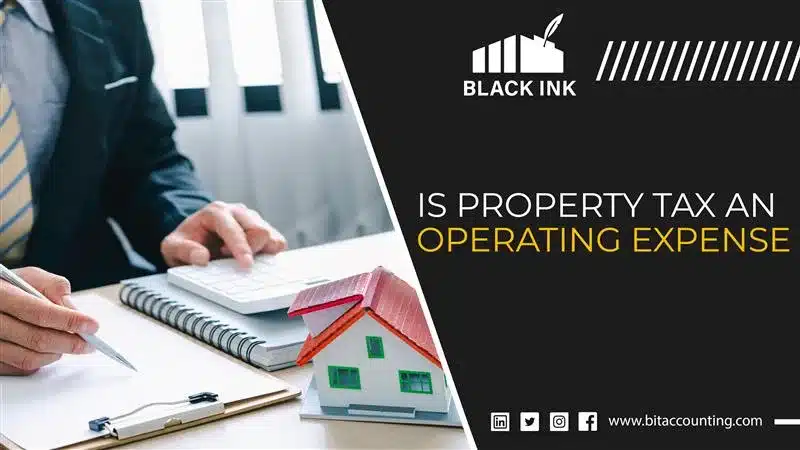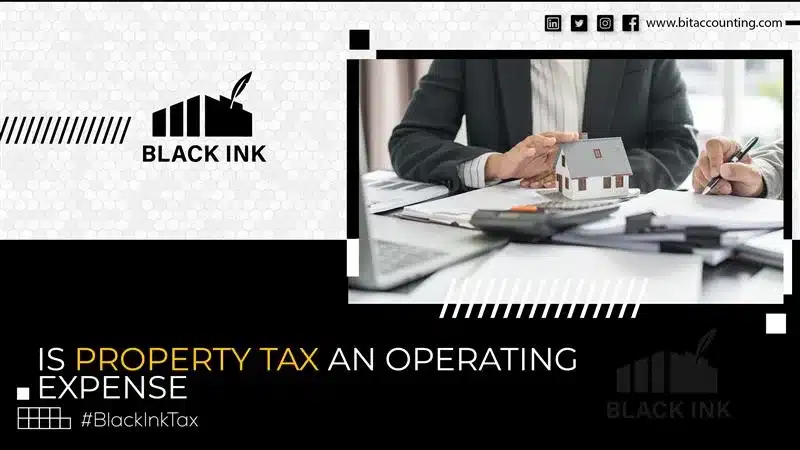
Table of Contents
The Big Debate: Is Property Tax an Operating Expense?
Have you ever wondered whether property tax should be considered an operating expense? If you’re a business owner, real estate investor, or just someone trying to understand how your financial statements work, this question matters more than you might think.
Let’s start with the basics. Property tax is a payment made to the local government based on the value of your land or building. It helps fund schools, roads, emergency services, and other public services that keep our communities running. But when it comes to financial accounting, especially for businesses and investors, there’s often confusion about where this tax fits.
Is it just a cost of owning property, or is it part of the day-to-day expenses like utilities, insurance, and maintenance?
This article breaks it all down. We’ll explain what property tax is, what operating expenses (OPEX) are, and why there’s so much debate around this topic. You’ll learn how businesses, accountants, and real estate pros handle this in practice—and what it means for your own money decisions.
Understanding Property Tax
Before we dive into the debate, let’s understand what property tax actually is.
Property tax is a levy placed on real estate by local governments. It’s usually based on the assessed value of the land and any buildings on it. The formula is pretty straightforward:
Property Tax = Assessed Value × Local Tax Rate
These taxes pay for things like:
- Public schools
- Street repairs
- Fire departments
- Libraries
- Water and plumbing systems
Whether you’re a landlord, business owner, or homeowner, this is one tax you can’t avoid. It’s part of government finances, and missing a payment can lead to penalties or even property loss.
Types of Property Tax
There’s more than one type of property tax. Here’s a quick overview:
- Real property tax: This is the most common and applies to land and buildings.
- Personal property tax: Some states or countries also tax movable business items like office equipment or tools.
Different places have different rules. Some offer tax deductions, others set limits (caps) on how much your property’s value can go up each year. These variations affect how you calculate and report the expense on your income statement or balance sheet.
How Property Tax Differs from Other Taxes
Unlike income tax or sales tax, property tax isn’t based on money earned or spent. It’s tied to the value of the asset, not your business’s performance.
This makes it feel more like a fixed cost, something you owe no matter what’s going on with your revenue or profits.
Understanding Operating Expenses (OPEX)
Next, let’s talk about operating expenses—also called OPEX in business terms.
These are the costs you pay just to keep your business running every day. They show up on your cash flow statements and play a big role in how investors and owners view the profit of a business.
Common examples include:
- Wages and salaries
- Electricity, water, and heating
- Office supplies
- Repairs and maintenance
- Insurance
- Property management fees
Key Characteristics of Operating Expenses
Operating expenses are:
- Recurring: You pay them regularly—monthly, quarterly, or yearly.
- Necessary for business: Without them, your business can’t function properly.
- Excluded from CapEx: They’re different from capital expenditures (CapEx) like buying a building or upgrading major equipment.
Operating expenses are listed on the income statement, not the balance sheet, and they reduce net income—the money left after all costs are paid.
Operating Expenses in Real Estate
In real estate investing, OPEX has a special meaning. For landlords and investors, these are the costs needed to keep a property rented and profitable.
That includes:
- Maintenance
- Leasing commissions
- Utilities
- Property tax

Is Property Tax an Operating Expense: The Case
Here is the case why people ask “is property tax an operating expense”:
Why Many Consider It an Operating Expense
Here’s the case for including property tax as OPEX:
- It’s recurring: You pay it every year, just like insurance or management fees.
- It’s tied to the property: If you want to keep owning and making money from the property, you must pay the tax.
- It shows up in NOI calculations: Real estate investors use something called Net Operating Income (NOI) to measure performance. Property tax is usually deducted when calculating NOI.
However, for people managing rental homes or commercial buildings, property tax feels like a natural part of regular expenses.
Accounting Standards Supporting This View
Even major accounting rules support this idea.
- GAAP (Generally Accepted Accounting Principles) allows companies to list property tax as an operating expense in their financial reports.
- The Internal Revenue Service (IRS) also lets rental property owners claim property tax as a tax deduction—just like other business costs.
This helps with budgeting, cash flow, and financial management. It’s a line item businesses can forecast each year.
Practical Implications for Businesses
Classifying property tax as an operating expense helps with:
- Cash flow planning: It’s a predictable cost.
- Tax planning: You may be able to deduct it.
- Profit calculations: It impacts net income, just like any other expense.
In short, it’s useful for accountants, property managers, and investors who rely on financial software like QuickBooks or NetSuite.
The Case Against Property Tax as an Operating Expense
Not everyone agrees, though. Let’s look at the other side.
Arguments for Exclusion from OPEX
Some experts argue property tax doesn’t belong in the same group as wages or utility bills because:
- It’s not tied to business activity: You owe it even if the property is empty.
- It’s based on government valuation, not something the business controls.
- It doesn’t help you create goods or serve customers—it’s just a fee for owning land.
Alternative Classifications
Others prefer to treat it as:
- A fixed cost, like rent or interest on a loan.
- A non-operating expense, meaning it’s not part of daily operations.
In some corporate finance teams, it’s listed under “Other Expenses” on financial reports.
Property Tax Appeals and Valuation Challenges
Another issue? You can appeal property tax assessments. If you think your property is overvalued, you can file a complaint and maybe pay less. That’s not something you can do with most other operating expenses.
Also, in real estate appraisal, property tax may be used in cap rate formulas, which sometimes creates a circular logic when valuing income-producing properties.
Industry Perspectives and Variations
Here are some industry perspectives and variations you need to know:
Real Estate Investors vs. Corporate Accountants
- Investors: Almost always treat property tax as OPEX when calculating NOI.
- Corporate accountants: May list it differently, especially in non-real estate businesses.
This shows how context matters. Your industry, your business structure, and even your location can affect how property tax is reported.
Tax Implications in Different Business Structures
- If you own rental property, property tax is fully deductible.
- If you’re a homeowner, you can only deduct it if you itemize, and only up to the SALT limit (State and Local Tax cap).
International Variations
In some countries, property tax is mixed with land-value tax or handled entirely differently. Public finance rules vary, and that changes how taxes are recorded and paid.
Best Practices for Handling Property Tax in Financial Reporting
Here’s how to handle property tax smartly, based on who you are:
For Real Estate Investors
- Include property tax in NOI, but track it separately for appeals.
- Use tools like Excel spreadsheets to monitor payments.
For Business Owners
- Talk to your accountant about the best way to list the expense.
- Keep up with tax assessment notices to avoid surprises in your budget.
For Accountants and Financial Analysts
- Follow GAAP or IFRS rules, and clearly document your choice.
- Watch for jurisdictional differences in property tax laws and reconciliation practices.
Conclusion
So, is property tax an operating expense? The answer depends on who you ask.
- For real estate investors, it’s clearly part of operating costs.
- For some corporate teams, it’s more like a fixed or non-operating cost.
- Accounting standards like GAAP usually support treating it as OPEX.
In the end, it’s not just about where you list the cost—it’s about being clear, consistent, and smart with your financial reporting.
At BIT Accounting, we help businesses and investors understand these gray areas in finance and make the right decisions for their unique needs. Whether you’re filing taxes, managing properties, or reviewing your income statement, knowing where your money goes is key to growing your wealth.
FAQs
1: Is property tax always considered an operating expense?
Not always. In real estate, it usually is. But in corporate accounting, it might be treated differently depending on the business type.
2: Can I deduct property tax on my income tax return?
If it’s a rental property or business asset, yes. If it’s a home, only under specific rules and limits.
3: What’s the difference between an operating expense and a capital expenditure?
Operating expenses are recurring costs like utilities and insurance. Capital expenditures are one-time costs for things like buying property or upgrading equipment.
4: Where does property tax appear on financial statements?
Usually on the income statement under operating expenses—but not always. It can also be listed as a separate line item or included in cost accounting systems.
GET FREE QUOTE FOR ALL OF OUR SERVICES
Black Ink will send you a free analysis of your current state and what would be the cost of managing either a separate accounting and bookkeeping services or a complete solution across New York, USA. Do get in touch and we will be happy to consult you with our bookkeeping services in NY, New York, USA.
